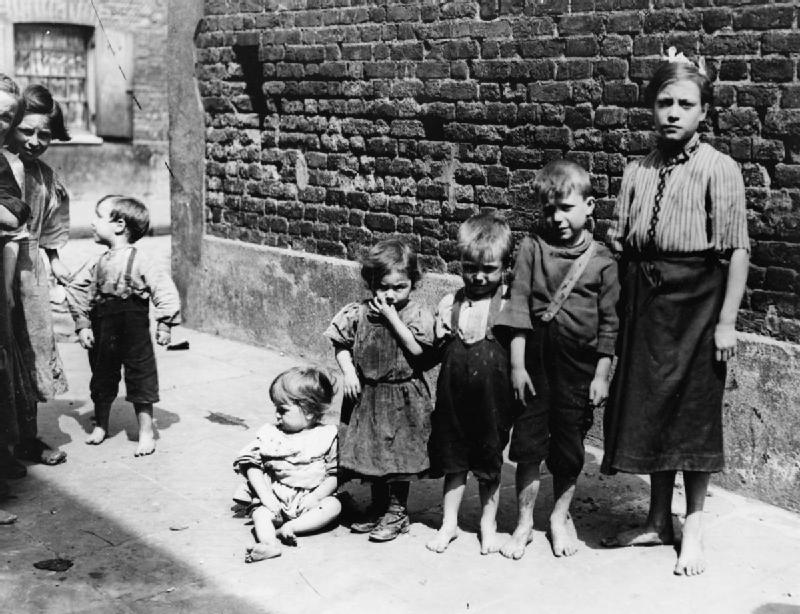Childhood adversity doesn't just affect our choices. According to research, it also weakens the body's fundamental ability to stay healthy in old age
Poverty remains a widespread problem. In the UK, 30% of children are growing up in poverty.
More than half of these children are in working households, and poverty is on the rise even for children whose parents work in government-funded jobs.
According to new research from the University of Geneva, these children may be at risk of poorer health in adulthood – even if they escape poverty later in life. This suggests that childhood adversity doesn’t just affect our choices, but also directly compromises the biological ability of our bodies to stay healthy.
Our childhood affects our health across the course of our lives. Stress, it seems, is a major contributor. While a life lived with financial, educational and social security and stability may not be free of worries, a disadvantaged childhood means more exposure to a number of difficult circumstances and events. These may include social tensions, domestic abuse, neglect, food and fuel poverty, unsafe or poor quality housing, and separation from caregivers.
These life events understandably cause stress. Most of us will have personal experience of responding to pressure at work or a relationship breakdown with ice cream, cigarettes or alcohol, or giving the gym a miss. When facing financial troubles, the health benefits of vegetables can seem trivial to parents in the face of the time- and money-saving virtues of junk food. Feeling like you do not have enough food, money, time, or friends occupies the mind so that there is less space to focus on decisions with long-term pay-offs.
Experiencing these feelings over a long period of time (rather than the shorter-term stress experienced when applying for a job or studying for an exam) can make it increasingly difficult to make healthy choices. Over a lifetime, choices add up. But this latest research suggests that chronic stress impacts more than just our choices.
In the new study of over 24,000 people across 14 countries, researchers found that individuals, particularly women, of lower socioeconomic status in childhood had lower hand grip strength in older adulthood – a reliable health indicator, predicting the risk of frailty, disability, and death from cardiovascular disease and cancer in older age.
While health-related behaviours such as exercise, nutrition, smoking and alcohol consumption were partially responsible for this link, adults from poorer backgrounds had weaker grip strength even if their socio-economic status improved later in life. This suggests that a tougher start in life has a direct, biological and lasting effect on an individual’s ability to stay healthy.
We already know that children suffering from long-term stress build up higher levels of the stress hormone cortisol, making the body’s response to threats from the outside world change. Chronic stress in childhood is related to a host of diseases through mechanisms such as poorer mental health, changes in the body’s immune response to infection and injury, and increased blood pressure.
Now, we have evidence that growing up in poverty has a cumulative wear-and-tear effect on the physiological systems that govern how our bodies respond to our environment, permanently disrupting the ability of affected individuals to maintain good health in old age.
While more work is still needed to understand how early adversity affects our immune system and other physiological systems in later life, one thing is already clear. To make our society less stressed, happier and healthier, we need to recognise just how crucial a role hardship in childhood plays in determining an individual’s long-term health.
The argument that poverty and poor health are down to laziness or lack of willpower is itself lazy and too often thrown around. Poverty in early life affects not only how capable the mind is of making the right choices, but also how the body responds to adversity at a fundamental level. Far from being a resource drain, investing money in improving children’s quality of life could improve a range of health outcomes, and dramatically reduce the burden on a health-care budget stretched by the vast capital needed to care for older people.
Rock star Marilyn Manson got it right with the lyrics for Leave A Scar. What doesn’t kill you, in many ways, makes you weaker. Those who thrive amid deprivation do so in spite of, rather than because of, the difficulties they experience. Many less fortunate people will struggle to stay fit and well despite making healthy choices. We could do with providing them with a little more support, and a little less judgment.
Researcher in Social Epidemiology, University of York
Disclosure: Noortje Uphoff does not work for, consult, own shares in or receive funding from any company or organisation that would benefit from this article, and has disclosed no relevant affiliations beyond their academic appointment
This article was originally published on The Conversation. Read the original article


